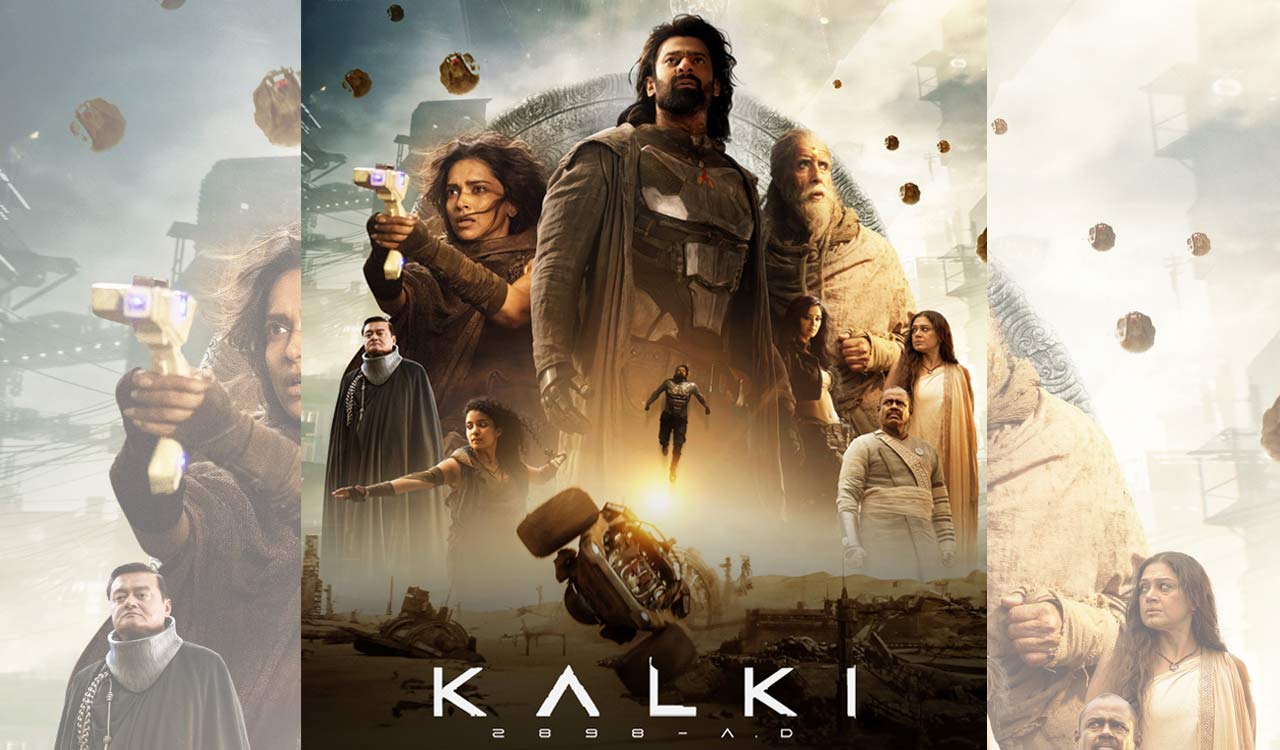
Within the runtime of 181 minutes, the movie is an audacious attempt to blend mythology with science fiction.
Updated On - 27 June 2024, 04:40 PM
Blending the ancient tales of the Mahabharata with a futuristic, dystopian world, ‘Kalki 2898 AD‘ directed by Nag Ashwin creatively combines fantasy with contemporary themes, in a way that hasn’t been widely been explored before in Indian cinema.
With a budget exceeding Rs. 600 crores and ambitious goals evident in its spectacular visuals, the movie has invested heavily in world-building and engaged story telling. However, its execution wavers with niggles in writing and screenplay.
Set in the dystopian times, Kasi is depicted as the last surviving city, yet everything in ruins. The mighty Ganges has dried up, life’s essentials confined within the Complex—a massive inverted pyramid under the control of Supreme Yaskin (Kamal Haasan). Striving for a better future, the tyranny is fought by the rebels from Shambala, a hidden refuge for people from different faiths and cultures.
Within the runtime of 181 minutes, the screenplay goes back and forth from Kurukshetra battlefield, Kasi, Shambala and the Complex. Prabhas‘s Bhairava is introduced as a laidback bounty hunter whose only goal is to enter the Complex and is in quest for one million units (currency).
Amitabh Bachchan as Ashwatthama, the immortal warrior from the Kurukshetra war, pitted against Prabhas’ Bhairava is a delight to watch. While the action scenes in the first few minutes feel a bit stretched, sequences between the duo strike a chord.
Other standouts in the first half are Kamal Haasan embracing a menacing role, SUM-80 or Sumati (Deepika Padukone) as a lab subject yearning for motherhood, and Ashwatthama realising that the time has come for his final battle. Not to forget Bhairava’s partnership with AI vehicle, Bujji (Bu-jz-1, with a voiceover by Keerthy Suresh).
However, Bhairava’s romance with Roxie (Disha Patani) seems contrived. The portion where he enters Complex seems artificial and one could have explored different ways to do that.
Kalki 2898 AD in the later half finds its stride by focusing on Sumati for emotional depth. Characters like Mariam (Shobhana), Veeran (Pasupathy), and Kyra (Anna Ben) play significant roles. Visually, the film is a feast. The epic battles, featuring futuristic tech and weaponry, are stunning on the big screen. The Mahabharatha sequences throughout the film are a splendid watch.
Santhosh Narayanan’s soundtrack enhances the film’s unique atmosphere, though some musical transitions are jarring. The narrative, rich with subtext and symbolic parallels, occasionally falters with predictable arcs and lackluster dialogue.
“Kalki 2898 AD” is a brave cinematic experiment that pushes the envelope of Indian cinema. Despite its flaws, it’s a visually spectacular and audacious attempt to blend mythology with science fiction, deserving of applause for its creativity and ambition.





Leave a Reply